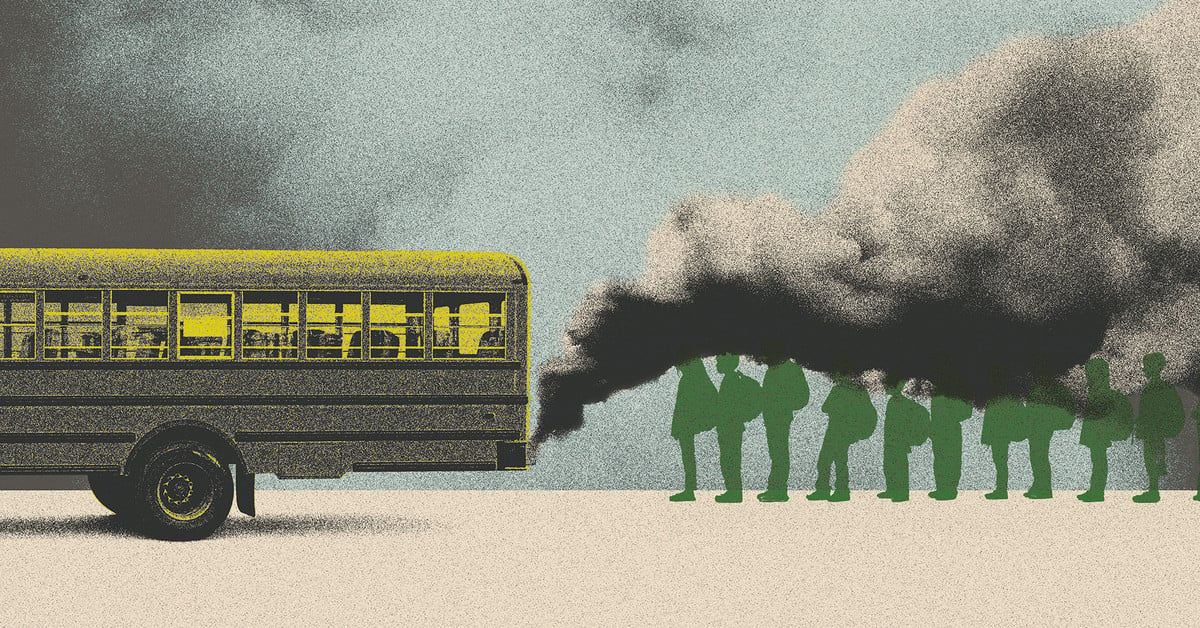- cross-posted to:
- [email protected]
- cross-posted to:
- [email protected]
Highlights: America’s school bus fleet is on the cusp of a transformative shift: Historically and still predominantly powered by diesel fuel, the humble and iconic yellow buses expose some 25 million school-aged children to ultrafine particles, sulfur oxides, and nitrogen oxides — all closely linked to asthma, respiratory illness, lung disease, and cancer, according to the Environmental Protection Agency and the American Cancer Society.
To make school buses better for the climate and for kids’ health, the federal government and states are pushing to electrify their fleets.
But even with federal subsidies, this shift to EV buses will be expensive, especially for public school districts, and the propane industry sees an opportunity to seize a share of the auto sector. Its representatives are working hard to convince public officials to switch to propane-fueled school buses, which they claim are “near-zero emissions” vehicles that are better for kids and the climate.
Except — that’s not true. Propane is still a polluting fuel: While it is refined differently than diesel and natural gas and combusted in uniquely styled engines, it still has a measurable impact on air quality and the climate. If PERC’s deceptive marketing to children, parents, and school administrators is successful, the propane industry threatens to lock in fossil fuels and their polluting emissions for another generation of schoolchildren.
Particulate matter, of which diesel combustion is a major source, contributes to roughly 15,000 premature deaths annually, according to EPA estimates. In some areas exposed to heavy diesel truck pollution, like near busy highways, the mortality levels from bad air are akin to those from traffic accidents and second-hand smoke. Emissions collect inside passenger cabins, elevating concentrations of particulate matter and air toxics somewhere between four and 12 times than would normally occur.
Diesel also causes students to miss more days of school. A randomized study published in the journal Nature Sustainability found replacing all pre-2000 school buses with newer models would lead to 1.3 million additional days of attendance from students each year.
But the propane industry sees a chance to grow its share of the auto sector by locking in school districts, and if you use a propane grill, fees on the fuel you buy are driving campaigns that don’t just include school assemblies, but other advertisements and influencers aimed at convincing kids, parents, and school officials to invest in the propane school bus.
The propane industry has targeted schools and public officials in a national campaign since at least 2018. Internal industry documents obtained by the renewables advocacy group Energy Policy Institute and reviewed by Vox show how propane, like other fossil fuel arms, has viewed the climate electrification movement as a key threat.
The Propane Education and Research Council, a federally created trade association, has a $47 million budget, funded from the half-cent fee it collects from every gallon of propane fuel sold, to support its public education campaigns. Beyond having a deep war chest to fuel its disinformation campaign, the industry has economics on its side, too: Propane-fueled buses cost significantly less than EVs, which come with a price tag of $350,000 and up.



This is the best summary I could come up with:
Last year, the popular children’s magazine The Week Junior advertised a contest called “Be Like Jack” that would award $2,000 to the preteens or teens who submitted the winning ideas for an environmental project.
A randomized study published in the journal Nature Sustainability found replacing all pre-2000 school buses with newer models would lead to 1.3 million additional days of attendance from students each year.
You may remember: After it came to light that the company had installed illegal software on a half-million diesel-burning vehicles to trick emissions tests, Volkswagen pleaded guilty to federal charges, ultimately settling for $14.7 billion — a big payout that drove the first real evolution toward electrifying the school bus.
States got to decide how they wanted to use that money, with many opting for incremental gains: Arizona, for example, spent $38 million of its share of the VW settlement to replace 330 older diesel buses with more efficient, but still diesel-running, models.
The 2021 Bipartisan Infrastructure Law created a $5 billion EPA Clean School Bus program, establishing two pots of funding: one meant only for electric buses and a second that could apply for alternative fuels or EVs.
Internal industry documents obtained by the renewables advocacy group Energy Policy Institute and reviewed by Vox show how propane, like other fossil fuel arms, has viewed the climate electrification movement as a key threat.
The original article contains 2,991 words, the summary contains 228 words. Saved 92%. I’m a bot and I’m open source!